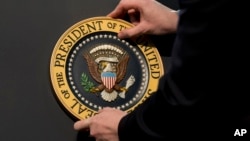It's an old constitutional question for which there is no clear answer: can a sitting U.S. president be charged with a crime?
The question has become newly relevant as a special counsel investigates possible links between the Donald Trump presidential campaign and Russians who attempted to interfere with the 2016 election.
There's no evidence that special counsel Robert Mueller will attempt to indict any of Trump's associates, let alone Trump himself. But Mueller does have authority to prosecute any federal crimes related to the investigation. At least theoretically, that could include the president.
Mueller is reported to be looking into whether Trump obstructed justice when he fired former FBI director James Comey.
If Mueller's team found evidence to bring charges against Trump, it could spark a legal battle that would almost certainly end up at the Supreme Court. And it's not clear which side would prevail.
Lack of clarity
While the Constitution lays out conditions under which a president can be impeached and removed from office, it does not directly address whether the president can be prosecuted. Neither does federal law. Courts have never ruled on the issue.
As a result of that lack of clarity, scholars base their judgement on more vague factors, such as constitutional principles and the original intent of the founders.
The prevailing view among legal scholars is that a sitting president cannot be indicted, according to recent reports. But legal opinion is divided, says Eric Freedman, professor of constitutional law at Hofstra University.
"It's an important and unsettled question," says Freedman, who sees indictment as an additional tool to impeachment to help keep the president accountable.
To make his point, Freedman cites the first meeting of the Senate, in which lawmakers engaged in a heated debate over the issue, according to the diary of one member.
What are the arguments?
For those who say the president is immune from indictment, the argument basically comes down to the practicalities of governance. A criminal indictment, they say, would prevent the president from carrying out his or her constitutionally assigned functions as head of the executive branch, effectively hobbling the government. They say this principle is implicit in the Constitution.
This is the position twice taken by federal lawyers in the U.S. Attorney General's Office of Legal Counsel, which has considered the issue in 1973 and again in 2000. It would not be proper, they argue, for a jury's guilty verdict to effectively overturn the will of the people, as expressed through a presidential election.
But those on the other side of the debate argue if the framers of the Constitution wanted to make presidents immune from indictment, they would have explicitly written that immunity into the text. They argue another constitutional principle - that no person, including the president, is above the law - supersedes other considerations.
Kenneth Starr, who headed the independent counsel investigation into former president Bill Clinton, espoused this view.
“It is proper, constitutional, and legal for a federal grand jury to indict a sitting president for serious criminal acts that are not part of, and are contrary to, the president’s official duties," according to a Starr office memo recently uncovered by The New York Times. "In this country, no one, even President Clinton, is above the law," the memo read.
Impeachment
James Pfiffner, a public policy professor at George Mason University, concedes the question is "really difficult."
"In principle, I think yes he can be indicted, but in practice probably not," he says.
In Pfiffner's view, the more constitutionally sound way of holding a president accountable is through impeachment, which effectively makes Congress the court that tries the president. But impeachment is a political, not legal, process, he says.
The Constitution says impeachable offenses include "treason, bribery, or other high crimes and misdemeanors," but Congress alone has the authority to interpret that standard.
All it takes for a president to be impeached is a majority vote by the House of Representatives, which essentially serves as an indictment of the president. A president could be removed from office if two-thirds of the Senate agree to "convict" the president.
Only two U.S. presidents have been impeached by the House of Representatives - Bill Clinton and Andrew Johnson. Both men were acquitted by the Senate. Richard Nixon resigned before the House could vote on his impeachment.
Pardons
Impeachment isn't the only way to hold a president accountable. After a president is removed from office, he or she can be prosecuted for crimes. That's of course, assuming the president hasn't been pardoned by his or her successor.
It's at least theoretically possible that presidents can also become immune from prosecution by pardoning themselves. Like the question of whether a president can be indicted, it's a constitutional cliffhanger that hadn't been considered much before now.
"You can't spell everything out in the Constitution," says Pfiffner. "And a lot of American government and constitutional law is based on norms" rather than strict legality or constitutionality.
That's worked pretty well for most of U.S. history, he says, "But when somebody goes against history and tradition and breaks those norms, then you've got to figure out what to do about it."







